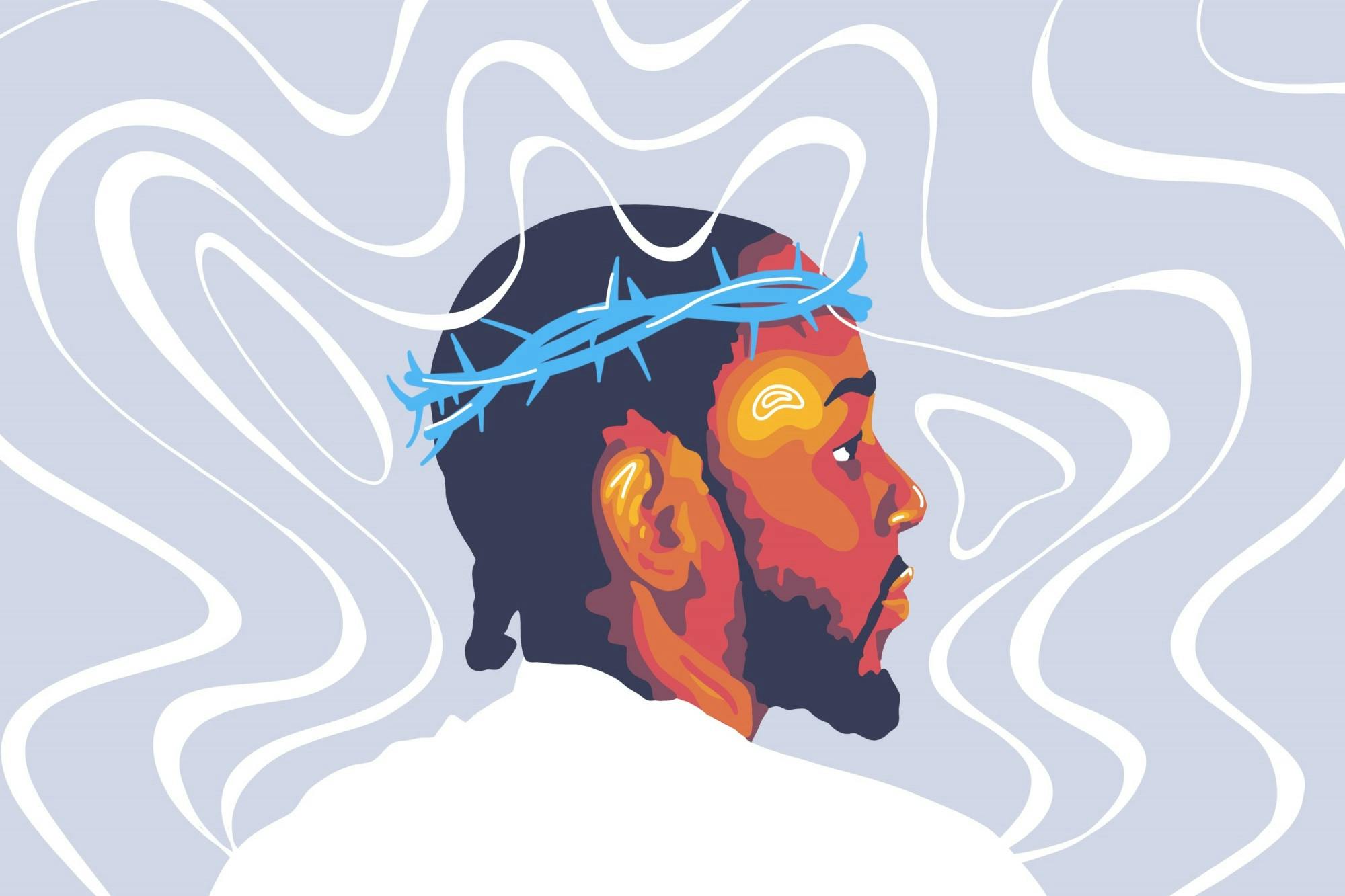On his last three albums, Kendrick Lamar has explored a range of lofty topics. On “Good Kid, m.A.A.d City” (2012), he used his experience as a teenager in Compton, CA., to make a general statement about growing up in impoverished urban areas. In “To Pimp a Butterfly” (2015), Lamar wrote about the experience of black people in America more broadly. In “DAMN.” (2017), Lamar wrote about emotions in a more abstract way; he was still presenting himself as a larger-than-life figure, one who many listeners treat as a role model. But now, after a five year wait, Kendrick finally makes an attempt to present himself only as a human being with faults and vulnerabilities on his new album “Mr. Morale and the Big Steppers.”
In the opening track of the album, “United in Grief,” Lamar notes that it has been 1,855 days since his last music release. While the reason for this extended hiatus is hinted at throughout the rest of the album, Lamar states it explicitly in the hook of the final song, “Mirror”: “I choose me, I’m sorry.” So many people looked up to Lamar and desperately wanted him to release an album sooner; however, he needed to take time to focus on and look after himself, necessitating a break from music. Lamar choosing his own mental health over the clamoring of his fans illustrates the raison d’être of “Mr. Morale and the Big Steppers.” Instead of writing about others, Lamar finally writes about his own demons.
The album’s fifth track, “Father Time (feat. Sampha),” is a great example of Lamar writing about his own issues. He recalls the toxically masculine way his father raised him that taught him to hide his emotions and conceal his pain. Over the course of two well-crafted verses, Lamar raps about the long lasting impact of his upbringing. His reflection feels genuine, especially given he considers how his tumultuous upbringing affected his relationships: “It’s crucial, they can’t stop us if we see the mistakes/’Til then, let’s give the women a break, grown men with daddy issues.” Combined with the counter-melody in the beat and Sampha’s beautiful rendition of the hook, this is one of the best songs on the album.
“We Cry Together,” the eighth track on the album, is a stunning reenactment of an argument between two partners. Lamar plays the male partner with Taylour Paige playing the female partner. Over the course of nearly six minutes, the two berate each other in a way that simultaneously feels completely natural yet perfectly choreographed. This extended argument takes place over a syncopated piano-based beat created by seasoned producer The Alchemist. This track is nothing if not entertaining, but it also gives insight into Lamar’s relationship issues.
The fourteenth track on the album, “Savior,” provides one of the best portraits of Lamar’s point-of-view regarding his public image. At the song’s beginning, Lamar lists himself, fellow rappers J. Cole and Future and NBA player LeBron James, stating “...but he is not your savior” after each one. Here, Lamar is saying that Black celebrities are often inappropriately idolized, revered not for their careers but blindly trusted because of their status. Later in the song, he uses the example of NBA player Kyrie Irving’s anti-vaccine stance: “Then I caught COVID and started to question Kyrie/Will I stay organic or hurt in this bed for two weeks?” Lamar worries that people will follow his example and blame him when they make the same mistakes he does — similar to how some people may have trusted Irving and followed his example for vaccines, on which he has no authority. Ultimately, this song provides a reminder that stars like Lamar are only human.
The penultimate song on the album, “Mother I Sober,” tells another deeply personal story about Lamar’s past. He recalls how, when he was five years old, his mother repeatedly asked him if his older cousin had molested him. While Lamar truthfully answered “no” to this question each time, the line of questioning in and of itself traumatized him. Lamar later learns that his mother’s concern over this topic stems from her being molested as a child. This leads to one of Lamar’s most poignant observations yet, “you ain’t felt grief ’til you felt it sober.” Lines like this exemplify the best aspects of Lamar’s introspection on this album.
However, the end of “Mother I Sober” demonstrates one issue that I have with the album: it’s introspective nature can feel forced, celebrating Lamar’s achievements in an inauthentic way. At the end of the song, Lamar’s real-life wife Whitney Alford says, “You did it, I’m proud of you/You broke a generational curse.” While this is not Lamar himself saying it, the fact that he chose to put it on his album feels very self-congratulatory. Perhaps he did break a generational curse, but the inclusion of this line and the following line from his daughter saying “Thank you, daddy…” feels forced.
Another song with, in my opinion, inauthentic introspection is the second track, “N95.” From a musical standpoint, this is easily one of my favorite songs on the album, with immaculate flow and a booming instrumental. However, the central idea of the song is somewhat off-putting to me. Lamar tells the listener to remove their metaphorical “masks” and follows it with “you ugly as fuck.” It’s moments like these that feel like Lamar is being abrasive for the sake of it, rather than exploring his own issues.
Despite some minor thematic missteps, this album largely lives up to the same level as the rest of Lamar’s discography. At the very least, I prefer “Mr. Morale and the Big Steppers” to his previous effort “DAMN.” This album is meant to be listened to with the intimacy of headphones — rather than loudspeakers — to understand the nuances and power of Lamar’s performance. If you have followed Lamar’s story up to this point, this is a worthy next chapter.
Rating: ★★★★☆




